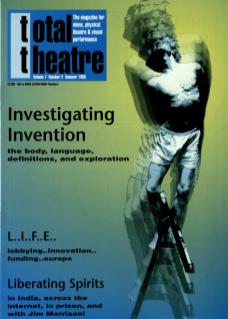In many ways, David Glass had everything against him in choosing to represent and explore the inner world and development of an autistic person. To genuinely and sympathetically transpose the physical problems someone with autism encounters onto a well-built and tall frame is one thing, but then to (re)create a theatrical and visual language in order to proceed with that journey is another matter altogether. Performed predominantly by David Glass with occasional interventions by Sarah Collins, Lucky sensitively and cogently explored the entrapment, claustrophobia, frustration and paranoia experienced by someone with autism. Tightly enclosed in a small, dark scaffold set, and accompanied by Collins' ingenious musical compositions, Glass' character travelled through the journey of discovery, a discovery of the ‘self’ withdrawn from reality. With a fine dynamic quality the whole show was touching and harrowing.
Unfortunately, the same could not be said of Thee Mosquito Coast... Performed on a raised, muddied platform the Ensemble failed to live up to its previous acclaimed work and its desire to explore physical and visual performance styles. There was little feel for the movement qualities of the coastal and jungle peoples of Central America and any exploration of Capoeira was never made manifest. Equally the staging lacked true innovation – a few flashes of inspiration were not enough to hold a two and half hour production together. The script failed to fully explore the familial and character exploration in Paul Theroux's novel and one was subsequently unable to feel any compassion towards the increasingly apparent disaster that awaited the Fox's expedition. Had the production been billed without such emphasis on the actor's physical explorations one may have been more appreciative, but without a well structured text this was unlikely.

